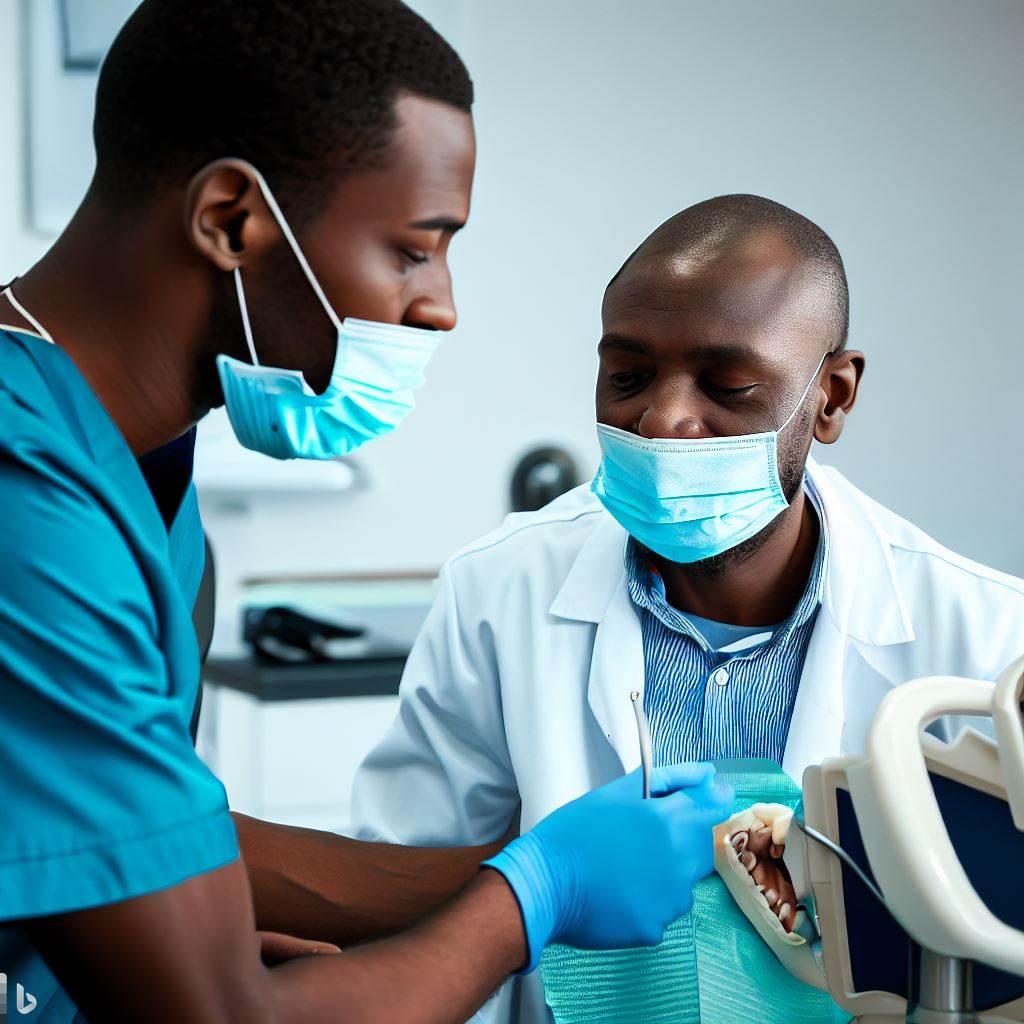Introduction
Dentistry in Nigeria differs between rural and urban areas, presenting various challenges and opportunities for dental practitioners.
Understanding these differences is crucial for providing effective dental care and improving oral health outcomes in both settings.
This section explores the variations in dental practice between rural and urban Nigeria and emphasizes the importance of adapting dental services to meet the needs of each region.
Dentistry in Rural Nigeria
Challenges faced by dentists in rural areas
- Lack of access to dental healthcare: Many rural communities lack proper dental facilities and services.
- Limited resources and equipment: Dentists in rural areas often face scarcity of essential dental tools and equipment.
- Inadequate infrastructure and facilities: Rural areas frequently lack proper dental facilities and infrastructure.
Strategies employed to overcome challenges
- Mobile dental clinics: Dentists travel to remote areas with portable clinics to provide dental care to underserved populations.
- Community outreach programs: Dentists organize programs to educate and raise awareness about oral healthcare in rural communities.
- Collaboration with other healthcare professionals: Dentists collaborate with other healthcare providers to bring comprehensive care to rural areas.
Dentistry in rural Nigeria faces challenges in providing quality oral healthcare due to limited access to dental services. Dentists lack proper facilities, resources, and equipment, affecting their ability to deliver care. Without accessible dental clinics, rural communities struggle to receive adequate dental treatment, impacting their oral health.
Limited funding makes it difficult for dental practices in rural areas to acquire essential tools and equipment. Inadequate infrastructure further compounds the challenges faced by dentists in rural Nigeria. To address these obstacles, dentists have implemented strategies like mobile dental clinics and community outreach programs.
Using portable dental clinics, dentists bring oral care directly to underserved populations in remote areas through community outreach programs, dentists educate and raise awareness about oral healthcare in rural communities. Promoting preventive measures and oral hygiene practices helps improve oral health outcomes among the population. Collaboration with other healthcare professionals allows for a holistic approach to healthcare in rural Nigeria.
By working with doctors, nurses, and other providers, dentists can address not only dental issues but also other health concerns. Despite the challenges, dentists in rural Nigeria remain committed to enhancing oral health in their communities.
Read: Dietitian Licensing Process in Nigeria: An Overview
Dentistry in Urban Nigeria
In urban Nigeria, practicing dentistry presents a distinct set of challenges and opportunities compared to rural areas.
This section explores the specific characteristics of dentistry in urban Nigeria, focusing on patient demographics and the availability of resources and facilities.
Differences in patient demographics
- Higher population density: Urban areas in Nigeria are characterized by a higher concentration of people, resulting in a larger patient base for dentists. This increased population density creates more opportunities for dental practitioners and a higher demand for their services.
- Diverse socioeconomic backgrounds: Urban Nigeria is a melting pot of different socioeconomic classes. Dentists in urban areas encounter patients from various income levels, educational backgrounds, and occupations. This diversity adds complexity to patient interactions and requires dentists to be adaptable and sensitive to different cultural and social norms.
- Increased dental awareness: Compared to rural areas, urban dwellers in Nigeria generally have a higher level of dental awareness. This is due to factors such as better access to education, exposure to media, and increased availability of dental information.
As a result, urban dentists may spend less time on basic oral health education and more on specialized treatments.
Availability of resources and facilities
- Well-equipped dental clinics: Urban areas boast well-equipped dental clinics with the latest tools and technologies. Dentists in urban Nigeria have access to state-of-the-art equipment, which enables them to diagnose and treat various dental conditions more efficiently and effectively.
- Advanced technology and materials: Urban dental clinics in Nigeria are equipped with advanced technologies and modern dental materials.
This allows dentists to offer a wider range of treatment options, including cosmetic dentistry, implantology, and orthodontics. These advancements attract patients seeking specialized and cutting-edge dental services. - Access to specialized dental services: Urban areas provide greater access to specialized dental services, such as oral and maxillofacial surgery, periodontics, and endodontics.
Dental practitioners in urban Nigeria have the opportunity to collaborate with specialists, ensuring comprehensive and tailored care for their patients.
In summary, dentistry in urban Nigeria differs from rural areas in terms of patient demographics, as urban areas have higher population density, diverse socioeconomic backgrounds, and increased dental awareness.
Additionally, urban dentists have access to well-equipped clinics, advanced technology, and specialized dental services. These factors contribute to a dynamic and competitive dental landscape in urban Nigeria, making it an attractive location for dental professionals seeking growth and advancement in their careers.
Read: Demand and Job Market for Dentists in Nigeria
Training and Education
Dental education in rural areas
In rural areas of Nigeria, access to dental schools is limited, making it difficult for aspiring dentists to pursue their education. These regions lack well-established dental institutions, which means that potential students have to travel long distances to urban areas where such schools are available. This not only adds to the financial burden but also poses a challenge to those who are unable to leave their rural communities for various reasons such as lack of financial resources or familial responsibilities.
Moreover, dental students in rural areas face several challenges throughout their education. The scarcity of dental schools means that these institutions are often overcrowded with limited resources and faculty members. This leads to a lack of individual attention and mentoring, hindering the students’ learning and skill development.
Additionally, the rural areas might lack the necessary infrastructure and modern equipment, restricting hands-on practice and exposure to the latest dental techniques and advancements.
Dental education in urban areas
In contrast, dental education in urban areas of Nigeria provides students with several advantages. Urban regions have established dental schools that offer more opportunities and resources for aspiring dentists. These schools have a larger faculty and better infrastructure, enabling a higher quality of education. Students benefit from modern facilities and equipment, allowing them to gain practical experience and develop their skills effectively.
Furthermore, urban areas provide exposure to a wider range of dental cases.
The larger population and diverse patient pool in urban communities allow dental students to encounter various dental conditions, from common to complex cases. This exposure broadens their understanding and enhances their clinical expertise, preparing them for a future dental practice.
Importance of equal access to quality education
Equal access to quality education is crucial for aspiring dentists, regardless of whether they come from rural or urban areas. It is important to bridge the educational gap between rural and urban regions to ensure fair opportunities for everyone.
By providing adequate resources and establishing dental schools in rural areas, aspiring dentists from these areas can receive the same level of education and training as those in urban areas. Equal access to quality education also helps address the shortage of dentists in rural areas.
By encouraging and supporting dental students from rural backgrounds, they are more likely to return to their communities and provide much-needed dental care. This would improve the oral health outcomes of rural populations and reduce the healthcare disparity between urban and rural areas.
In review, dental education in rural and urban areas of Nigeria presents distinct challenges and opportunities. While rural areas face limited access to dental schools and challenges for students, urban areas offer more resources and exposure to varied dental cases.
However, ensuring equal access to quality education is essential to bridge the educational gap and address the shortage of dentists in rural areas. This would ultimately contribute to improved oral health outcomes and reduce disparities between rural and urban communities.
Read: How Dental Practices Operate in Nigeria

Learn More: Physical Therapy Specialties: A Focus on Nigeria’s Demand
Job Opportunities and Professional Growth
In terms of job opportunities and professional growth, dentists in rural and urban Nigeria face different prospects.
This section will explore the job prospects for dentists in both settings and discuss the advantages and disadvantages associated with each.
Job prospects for dentists in rural Nigeria
- Limited employment options: Dentists in rural Nigeria often face limited opportunities for employment.
The number of healthcare facilities in rural areas is lower compared to urban areas, resulting in fewer job openings for dentists. - Private practices in small communities: Despite the limited employment options, dentists in rural Nigeria may find opportunities in private practices.
These practices cater to the oral healthcare needs of small communities, serving as the primary dental care providers in those areas. Dentists working in these settings often play a crucial role in improving oral health in rural communities.
Job prospects for dentists in urban Nigeria
- Wide range of options in private and public sectors: Dentists in urban Nigeria have a broader range of job options available to them. They can choose to work in private dental clinics, public hospitals, or academic institutions.
The presence of multiple healthcare facilities in urban areas ensures more employment opportunities for dentists. - Opportunities for specialization and career advancement: Urban Nigeria provides dentists with opportunities for specialization and career advancement. Dentists can choose to specialize in various fields such as orthodontics, periodontics, or oral surgery.
Urban areas also offer avenues for research and academic pursuits, allowing dentists to further develop their professional skills and knowledge.
While urban Nigeria offers more diverse job prospects for dentists, there are advantages to practicing dentistry in rural areas as well.
Dentists working in rural communities often have the opportunity to make a significant impact on the oral health of underserved populations. They can establish strong relationships with their patients and contribute to the overall improvement of dental care in these communities.
However, dentists practicing in urban Nigeria may have higher earning potentials due to the larger patient base and more advanced facilities available in urban areas. Urban settings also offer better access to resources and continuing education opportunities, which can contribute to professional growth and development.
In summary, dentists in rural and urban Nigeria have different job prospects and professional growth opportunities. While rural Nigeria may provide limited job options, dentists working in small communities can have a significant impact on oral health.
On the other hand, dentists in urban areas have a wide range of employment options, possibilities for specialization, and access to advanced resources for career advancement.
Read: Impact of Health Policies on Dentistry in Nigeria
Conclusion
Recap of key points
In rural Nigeria, dentists face challenges like limited resources and infrastructure. Urban areas in Nigeria have a higher concentration of dentists and better access to dental care. There is a shortage of dentists in both rural and urban Nigeria. The need for oral healthcare is high in both rural and urban areas.
Importance of balanced dental healthcare distribution
A balanced distribution of dental healthcare is crucial to ensure that everyone, regardless of their location, has equal access to oral healthcare services and resources. It is essential to address the growing demand for dental care in both rural and urban Nigeria.
Call to support and address the needs of dentists in both rural and urban Nigeria
We should prioritize efforts to support dentists in rural areas by providing better infrastructure, resources, and training opportunities.
Additionally, there is a need for strategies to encourage dentists to practice in rural areas, such as offering incentives and improving working conditions.
In urban areas, it is important to address the increasing demand for dental care by expanding dental clinics and ensuring a sufficient number of dentists are available to meet the needs of the population.
To sum it up, achieving a balanced distribution of dental healthcare in Nigeria is crucial for the overall dental health of the population. By addressing the challenges faced by dentists in both rural and urban areas, we can ensure that everyone has access to quality dental care and improve the oral health outcomes for all Nigerians.




